Commentary
Episode 511: Peaches And Herb, And The Plot Sickens!
- by May 30, 2012
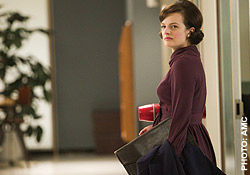 Jarring, sad, painful, “The Other Woman” was the best episode of the season by far, but also the most sickening. It deftly called into question the
whole idea of ownership, and whether, like a curvy car, a sexy female employee is merely a commodity to be bought and sold for the right price.
Jarring, sad, painful, “The Other Woman” was the best episode of the season by far, but also the most sickening. It deftly called into question the
whole idea of ownership, and whether, like a curvy car, a sexy female employee is merely a commodity to be bought and sold for the right price.
Never mind the Brylcreem and sharp suits; “Mad Men” is really about the shifting identities of women. It’s been a real eye-opener to see how rigid and limiting gender roles were in mid-century America. The phrase “hostile workplace” did not exist then, but for women, the daily harassment was just part of the deal. Life was one big casting couch, and the women were all auditioning.
In the second season, Don’s then-other woman, Bobbie, gives Peggy some advice. ”You can’t be a man,” she says. ”Be a woman. It’s powerful business when done correctly.”
advertisement
advertisement
But there were no blueprints for how to do it at all, never mind correctly. And this episode, about women and money, focused on the career moves of Joan and Peggy (and Megan, to a lesser degree) and lobbed some real shockeroos. There was no crying in advertising in this episode, only whisky, potpie, and various degrees of whoredom.
Then again, we got echoes of the same sad theme that haunts almost every “Mad Men” episode: references to Don’s prostitute mama who died in childbirth. She was the mother of all “other women.” Her death was the ultimate innocent act of abandonment and betrayal. To this day, her absence shades all of Don’s behavior towards women, and he will always be one angry, conflicted whore child.
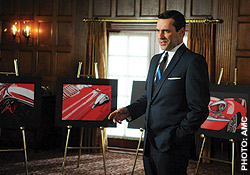 But back to our story: Pete the procurer is desperate to get
the Jaguar account, not only to make his mark on the agency, but also because he thinks it will allow him to get a bachelor pad in the city. We already know he’s despicable. So he lights up when
he hears the Jaguar-dealer guy say he wants a shot at the “dynamite redhead built like a B-52,” who is, he hopes, a “free spirit, open to new ideas.”
But back to our story: Pete the procurer is desperate to get
the Jaguar account, not only to make his mark on the agency, but also because he thinks it will allow him to get a bachelor pad in the city. We already know he’s despicable. So he lights up when
he hears the Jaguar-dealer guy say he wants a shot at the “dynamite redhead built like a B-52,” who is, he hopes, a “free spirit, open to new ideas.”
In fact, the client is asking for the oldest thing in the book, and Joan, while a “red-hot numbah” is a resigned spirit, hardly free. A decade or so older than Peggy, she’s in a tougher spot. For whatever reason, she’s turned down Roger’s offer of child support. So for baby care, she is tethered to her mother, an attention-starved alcoholic who “trained” her to be “admired.” In essence, her mother is her madam. (And now Joan’s fridge is on the fritz and her house stinks.) She complied with her mother’s training, making use of her headlight/tailfin body, despite the fact that she’s smart and super-capable at every thing she does. She was Roger’s “other woman” for many years, and he treated her terribly. (The baby is a result of their sidewalk tryst.) She’s just getting out of marriage to a doctor (what could be more socially acceptable?) who raped her and neglected her emotionally.
So Pete goes back to the office and pulls every weaselly, guilt-inducing, manipulative, passive-aggressive card in the pack to get Joan to consider the proposition. (Basically, he reduces his pitch to “we’re going to lose Jaguar unless you fuck Herb.”) When Joan confronts him with the word “prostitution,” he comes up with a with a weird Cleopatra analogy. (The Egyptian queen is believed to have consummated a liaison with Caesar to solidify her grip on the throne.) Pete counters that it’s not the p-word: it’s business at the highest level. Once he gets the lie in motion, the partners, with the exception of Don, fall into a sort of chain reaction of sleaze.
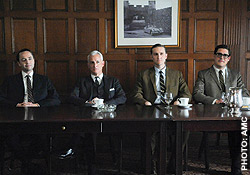 Lane also responds
out of self-interest. He has to keep his embezzlement covered up, and can’t go back to the bank for a loan, so he urges “Mrs. Harris” not to make the same mistake he did -- and,
instead, to ask for 5% of the business and a full partnership. Joan, wearing a dress that has an animal print tail (catch a tiger) decides to go through with it, and demands papers by
evening.
Lane also responds
out of self-interest. He has to keep his embezzlement covered up, and can’t go back to the bank for a loan, so he urges “Mrs. Harris” not to make the same mistake he did -- and,
instead, to ask for 5% of the business and a full partnership. Joan, wearing a dress that has an animal print tail (catch a tiger) decides to go through with it, and demands papers by
evening.
Poor Cleopatra. Joan’s John, a character named Herb Rennet (love the Dickensian name-- reminds me of stinky cheese) might not be Caesar, but he is the closest figure to Tony Soprano that we’ve ever seen on “Mad Men.” He’s got the accent, the, hairy chest, pinky ring, fine silk robe, “Continental” manners, and all.
Herb says he was too shy to ask Joan to dinner. Still, I was screaming at the screen in horror at the way she delivers herself to Herb’s hotel room for his delectation, rolled in like the platter of hot red lobsters from the Palm. In the real world, he would take her for drinks and dinner first, no? And he certainly isn’t shy about asking her to “let me see ‘em.” I thought she’d actually run at that moment, but instead she turns her back toward him and starts to unzip her dress. Christina Hendricks deserves an Emmy for her performance, her face a zoned-out mask, her blue eyes cold and lapidary. Herb mixes up two stories: Sheik of Araby and Helen of Troy. The fall of Troy came to represent a fall from an illustrious heroic age, but the story here is just plain ugly and vulgar, to use Megan’s word – also the word from Don when the male copywriters want to use “mistress” to refer to Jaguars.
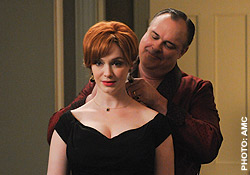 Thankfully, we are spared Herb’s sweat and passion. But through an inspired bit of intercutting, shots of the couple are juxtaposed,
Godfather-like, with Don and his team going into battle for the pitch. Also wonderful was the Rashomon-like sequence that played with time, repeating the scene of Don going to Joan’s pink
apartment to stop her from going through with the deal. She greets him as the courtesan in the silk kimono, and says she was “just stepping in the shower” (to wash off the stain). The
first time, we don’t know that under her robe is the Madame X-like velvet dress that she wore for the encounter that already happened.
Thankfully, we are spared Herb’s sweat and passion. But through an inspired bit of intercutting, shots of the couple are juxtaposed,
Godfather-like, with Don and his team going into battle for the pitch. Also wonderful was the Rashomon-like sequence that played with time, repeating the scene of Don going to Joan’s pink
apartment to stop her from going through with the deal. She greets him as the courtesan in the silk kimono, and says she was “just stepping in the shower” (to wash off the stain). The
first time, we don’t know that under her robe is the Madame X-like velvet dress that she wore for the encounter that already happened.
Joan’s assent to the deal is partly a Romeo and Juliet-like mixup: She felt thwarted, and particularly humiliated that Roger agreed (which he didn’t, really.) So she is genuinely touched that Don came to save her, if too late. “You’re a good one” she says, and gently touches his cheek, holding it a bit too long. I saw this as a parallel gesture to Don’s later kissing of Peggy’s hand.
But the problem hardly ends here. Despite her pluck, what if Joan went through all of that, bargaining for a partnership that turns out to be worthless? What if Mr. Stinky Cheese plays the “droit de seigneur” card and insists on continuing? And even if she gets to be a “non-silent” partner, won’t that position always be tainted by the way she achieved it? The story will no doubt arouse gossip and snickers, both within the agency and in the industry.
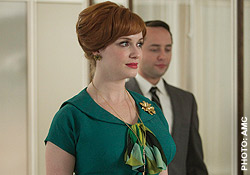 Aside from his own mother issues, Don wanted Joan to
stay out of it so he’d know that he won the account only through the work -- which was, indeed, truly great. I think the writers overplayed the basic Dichter dictum in advertising: in the late
1930s, Ernest Dichter, a Viennese emigre trained in Freudian analysis, and the father of “motivational research,” worked with Chrysler to introduce the Plymouth. He famously came up with
the idea that a sedan is your wife and a sports car is your mistress.
Aside from his own mother issues, Don wanted Joan to
stay out of it so he’d know that he won the account only through the work -- which was, indeed, truly great. I think the writers overplayed the basic Dichter dictum in advertising: in the late
1930s, Ernest Dichter, a Viennese emigre trained in Freudian analysis, and the father of “motivational research,” worked with Chrysler to introduce the Plymouth. He famously came up with
the idea that a sedan is your wife and a sports car is your mistress.
I’m not sure what Ginsberg’s story with women is. He was the only one to turn away from the Richard Speck pictures, and he did the same with the performance on the conference room table, with Megan’s friend desperately clawing her way across on all fours to mimic being a Jaguar. Meanwhile, Ginsberg’s former colleague, Mrs. Draper, has whisked the big man away for a little impromptu sex in his office. And that’s when it hits him: She can come and go as she pleases. Don has no control over her. Which results in the winning tag line: “At last. something beautiful you can truly own.”
And Don can take it and go all “Carousel” on the pitch, in a perfect return to the winning Don of old.
Meantime, while the boys were eating lobster, Peggy was left with literally the shit: Secol Laxatives, and all the other lesser accounts, which she handled admirably.
In fact, she saves the day, with her on-the-spot redux of a Chevalier Blanc commercial. It’s a reverse of the usual female paradigm, with a prince coming along on a white horse to save a fair damsel. Instead, Peggy changes the commercial for Valentine’s Day to use the same beginning but then introduces a Lady Godiva figure to scoop up the male hero and ride off. It’s genius in that it works on both sides, since the Lady, says Peggy, is as “naked as we can make her.”
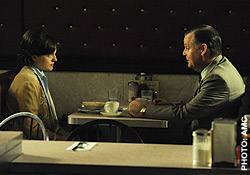 For at least
the last year, Don has in turn neglected, barked at, and/or taken Peggy’s hard work for granted. But when the team comes to tell him about the Chevalier save pitch, and Peggy insists she should
be the one to go to Paris, he blows up and throws money at her. This is over the top, and demeaning.
For at least
the last year, Don has in turn neglected, barked at, and/or taken Peggy’s hard work for granted. But when the team comes to tell him about the Chevalier save pitch, and Peggy insists she should
be the one to go to Paris, he blows up and throws money at her. This is over the top, and demeaning.
It’s interesting that Peggy actually has a mentor: Freddy Rumsen is back, and he’s clear-eyed and sober. Yup, the guy who peed his pants and fell asleep, but also picked Peggy out of the secretaries to write, gives her great career advice. He tells her to take some meetings and leave. “ Let him know that you’re not some secretary from Brooklyn who’s dying to help out,” he says, and it stops her in her tracks. She’s over worrying about Don. When she hardheartedly tells Cosgrove “Save the fiction for your stories,” she’s really talking to herself.
That leads to an offer from Dick Cheogh, he of the oddly spelled last name. As with the SCDP partners, he’s hardly being selfless: he wants to stick it to Don by hiring Peggy. And when she comes up with an emotion-free bargaining technique -- writing it out on a pad -- he asks, “Did Freddy tell you to do that?” Still, she gets a salary of $19,000, which is roughly $150,000, easily double what she was making. (Joan was earning $12, 500 after 13 years.) And Peggy gets to come in with a fresh slate as copy chief. She’s earned it.
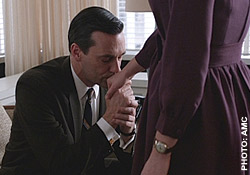 I was exhilarated by the ending. We all know
Peggy’s beginning, as a dowdy little mouseburger (as Helen Gurley Brown would say) right out of secretarial school. She’s made a complete transformation. This is a triumph. As the agency
celebrates the Jaguar win, she speaks to Don. He goes through all the stages of grief when he realizes that she is seriously leaving. And then he kisses her hand, for an uncomfortably long time,
suggesting deference -- that she is his queen.
I was exhilarated by the ending. We all know
Peggy’s beginning, as a dowdy little mouseburger (as Helen Gurley Brown would say) right out of secretarial school. She’s made a complete transformation. This is a triumph. As the agency
celebrates the Jaguar win, she speaks to Don. He goes through all the stages of grief when he realizes that she is seriously leaving. And then he kisses her hand, for an uncomfortably long time,
suggesting deference -- that she is his queen.
The final scene (I could hardly breathe!) shows Peggy leaving her office. She takes her coat, her purse, her portfolio, her thermos, her hat, and her mug. (I was hoping she’d throw her hat up in the air like Mary Tyler Moore.) Joan is the only one who sees her leaving, and gives her a knowing look.
She’s gonna make it after all. She stands at the elevator. (Oh, no, not the shaft!) Instead, there is light, and the great song from the Kinks: “Girl, you really got me now.”
She smiles and steps in. It’s a heroic moment, an epic poem.
The last thing she says to Don, after he kissed her hand, was “Don’t be a stranger.”
But we know he is the ultimate stranger, and always the other.



A great episode, and a column to match. I think all of those partners were horrible (except Don, can you believe it?). Joan may find out, as Don already knows, that this type of success is hollow. In Peggy's leaving, Don may be realizing that, while this is a business, what matters most is the people. What he did to Peggy, and what the partners did to Joan, is going to weigh on them far longer than the short-term success the Jaguar win may bestow. Every time they see Joan in a partners meeting, it will remind them of the hollowness of that win. There probably aren't enough episodes left for it to play out this year, but they are now as vulnerable as they were with Lucky Strike. If Joan doesn't sleep with Herb again, they'll be in the same position as when Sal wouldn't sleep with Lee Garner Jr.
your reviews/analysis of this fine program are by far the best Barbara!
In this when you you summed it up perfectly with:“Mad Men” is really about the shifting identities of women."
I lived that. On the television side of the business, and I couldn't agree more.
The greatest reward of management, media or otherwise, is watching people you mentor succeed. I think Don is beginning to "get it."
Herb's not actually the client though, right? He's part of some board that has some say over agency choice? I didn't really get that part. So maybe he's one and done. The darker side of me thinks Don is not going to let Joan off the whore-hook easily. He needs a new woman to abuse at work since Peggy took a powder. Then again, maybe it'll be Ginsberg he picks on. Can't decide who's more despicable, Pete, who let's it all show, or Don, who tries to hide it. Can't believe the season is almost over. :-( Goes so fast!
To me - this was the most clearly defined of all of the recent episodes - brilliantly tying in the over all advertising pitch of the week "Jaguar/ ownership of women" with the events in the main characters' lives. Very well done! I cried when Don kissed Peggy's hand.
@meany. The Jaguar cafone was, I think, the head of the dealer group that had one of three votes. Odd "a clef" kind of thing because there is almost a slander in attacking a real company's personnel through fictional dealings with a fictional agency in fictional pitch. Dealer groups, like franchisees, always get dissed by agency folk; however, when VW hired DDB it was initially through a dealer group, then called Worldwide Distributors itself an overstatement as their world consisted of the twi-state aream CT not yet having a VW dealership.
@Barbara. Once again, great clarity from your exegesis. I thought Don came out a hero, but only because in comparison he is one. But he has got to be tortured as he not only didn't do the work that got the account, but even his presentation's importance is put in doubt. The casting couch was amusing and additionally so because you can only imagine the latter stages of the audition that Meghan struck out on. I am about to embark on a viewing of the complete 25 years of the Simpsons which is a lot easier than reading the complete works of Dickens...you wouldn't have a Simpsons' libretto lying around, wouldja?
Funny you mentioned Mary Tyler Moore because I thought Peggy's resignation outfit was very much in MTM's style (even if it was in the late 70's). One storyline you overlooked was Megan's audition, which somewhat reminded me of the scene in the movie "Fame" when Irene Cara is asked to take off her blouse. Whenever Megan goes on an audition my friends always comment in their best catty fashion that she'll never get hired until she gets her teeth fixed.
@Rob: I felt it was getting excessively long, so didn't get into the Megan scenario. I read elsewhere that she was auditioning for "Little Murders," a Jules Feiffer play about New York City going to hell. (Trudy is made to seem rigid and overreacting, but most upper class younger people were fleeing then. By the early '70s, you could buy a co-op on Park Ave for $30,000. In the mid70s came the famous Daily News headline: "ford to city-- drop dead! and the city almost went bankrupt.
But back to the play. Apparently it only lasted for a few performances, but was turned into a movie later. I think Linda Lavin was in it. Hard to believe she got there via casting couch! And I agree about Megan's teeth. They make her kind of cute, though. She looked so childlike on the bed rehearsing her lines when Don came home and wanted to watch Carson.
Barbara, thanks for sharing this additional info. Because of the condition of Megan's teeth I had assumed she came from humble beginnings, so I was thrown when it turned out her parents were of a better social class. One more thing, where did Peggy's live-in beau go? Perhaps after going outside to get a cab for Peggy's mother (3 episodes ago?) he decided to keep on walking!
Barbara, are you saying that "Little Murders" was a flop? I remember it as a hit. Saw it at Circle in the Square. I remember the house being full. The film came years afterward. Ah, Wikipedia to the rescue. A flop on Broadway. Revived at Circle. I remember the play being better. One of the first things was Vincent Gardenia, I think, going to the front of the stage and pantomiming turning off an air conditioner, because it was supposed to be the middle of winter. They had been piping air conditioning noise through the PA for the entire seating period before the performance, so you got used to it and didn't notice it until it was turned off. The gag was that the son had turned it on to blot out the sound of violence in the street below.
People pretty much left their teeth as is in those days, except for excessive bulkiness and such. And when they did get them "fixed" they usually turned out like giant chicklets.
Don has a space when he smiles, too. @Tim-- thanks for that!
Nice touch about the air conditioning!
Megan goes to Boston ! That would open up the stories and Don's stagnation to regress, progress and move on. An iconic figure in Phila. was tall, handsome, intelligent, at last count married 4 times and quite the ladies man - back in the 70's, 80's. After the agency disbanded, he never went back into the agency business.